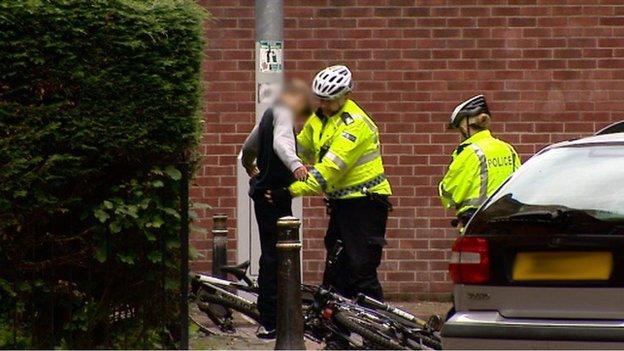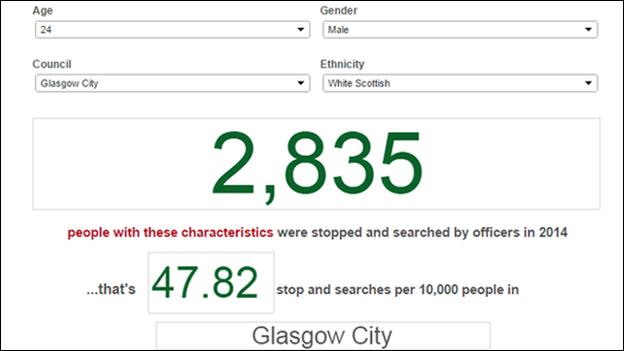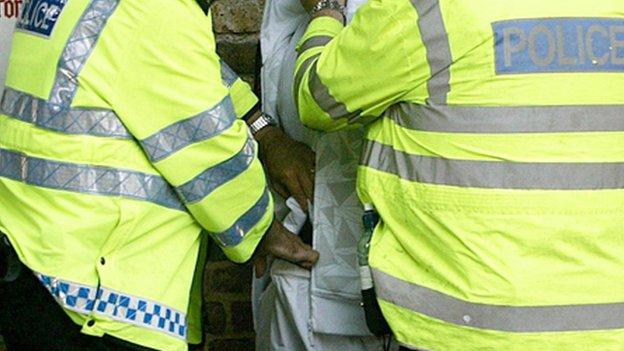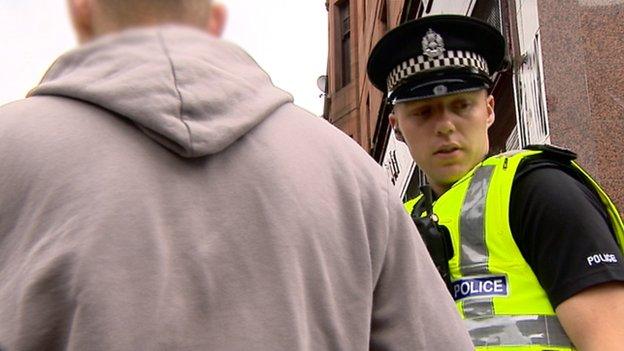Stop-and-search: Police officers accuse politicians of ignorance
- Published

Police Scotland is reviewing its use of consensual stop and search
Rank and file police officers have accused politicians of "ignorance" over consensual stop and searches.
First Minister Nicola Sturgeon revealed last week that senior officers at Police Scotland are considering ending the controversial tactic.
But the Scottish Police Federation (SPF) has now written to MSPs insisting the searches increase public safety.
And it defended the right of officers to carry out consensual stop-searches on children.
Police in Scotland have the legal power to stop and search members of the public in certain statutory circumstances when they have reasonable evidence that they are in possession of drugs, an offensive weapon or stolen property,
But in other cases they may ask for "consent" to a search when they have no legal power to require someone to be searched.
Police in England and Wales are not allowed to do this.
Last June, Police Scotland told MSPs it would abolish consensual stop-searches for children under 12.
Willie Rennie says consensual stop and searches need a statutory framework to enable police officers to do their job and to protect the rights of citizens
However, figures obtained by BBC Scotland revealed that 356 children in that age group had been stopped and searched since then.
They had been searched for alcohol, drugs, stolen property and weapons.
Acting unlawfully
That prompted the first minister to say she welcomed the idea of considering whether the tactic should be banned.
The Scottish Liberal Democrats have also have announced they are to bring forward legislation to make consensual stop and search illegal.
But Calum Steele, general secretary of the SPF, which represents 98% of Scottish police officers, has sent an open letter to MSPs which claimed ministers were in danger of acting unlawfully if they banned the searches.
He described the idea that politicians and the chief constable can decide which laws should be applied and when as "frightening".
And he claimed the debate on non-statutory or consensual searches had unearthed "frightening levels of political ignorance".

How many like me?

So, how many people, who are the same age as you, are from the same area as you and have the same ethnic background as you, been searched by the police?
Find out by going to our stop-and-search calculator, external developed by BBC Scotland data journalist Marc Ellison.

Mr Steele said: "The events of the past week have resulted in a frightening narrative that politicians believe that they are in a position and indeed have a role to play in determining how and when police officers exercise their right to stop and search someone.
"It is also alarming to read and hear reports that politicians consider that they are in a position to reach an agreement with or direct the chief constable of the day as to how and when such powers will be used.
"The authority of police officers to stop and search any citizen does not arise from the dictate of politicians nor from some non-existent power of the chief constable but comes from the law of the land both at common law and statute."
Mr Steele said it was important for the public to know that police officers were only carrying out stop-searches "in an effort to combat crime and to keep the public safe."
He added: "This is best done by training police officers how to exercise their powers and engage with the public in the interests of everyone rather than by political dictate or suggestion to chief constables that they have the power to overrule a well-developed system of law."

Mr Steele said it was "understandable and entirely correct" for politicians to question the use of the tactic on children.
But he also said it was an "absolute reality" that many children were "out and about in our communities without the slightest knowledge of their parents or guardians."
He added: "Many smoke from their pre-teen years, many more drink and yes occasionally some also carry weapons and drugs. No amount of wishing it wasn't so changes the fact that it is so and no amount of hand wringing changes the fact that police officers have to deal with thousands of calls every year involving pre-teenage youngsters.
"There may be no general statutory power to search at such calls but there is also no general statutory power to require a name, address or age. Perhaps the police should just do nothing and advise callers that "we have no statutory powers" and simply hope these youngsters come to, or cause no harm.
"When police officers exercise their powers to search they do so often under statute and in such circumstances they do not require consent, they can also search people they have lawfully arrested with or without a warrant. They can also ask individuals to consent to search and it's up to the individual whether they consent or not."
'Political interference'
Mr Steele said Police Scotland "has to carry much of the responsibility for the hostility toward the subject of stop and search".
He said the "numbers-driven target approach" was ill conceived and resulted in attention being directed away from crime prevention and detection.
"There are undoubtedly lessons to be learnt from the recent history of stop and search within the Police Service of Scotland", he said.
"These lessons however need to extend beyond the service itself and many parents and guardians need to take a greater responsibility for the actions of their children.
"The greatest lesson of all however must stem from the historic warnings that a single police service in Scotland could become subject to political interference.
"How quickly these concerns appear to have faded from the memories of those who now seek to exert what they so prophetically warned against."
A spokesman for Justice Secretary Michael Matheson said: "Police Scotland's decision to consult with the SPA, HMICS and partners on ending the practice of consensual stop and searches was confirmed to parliament by the first minister last week and we support the work the police are taking forward.
"We will explore whether any legislative changes are required once this process is concluded and presented to the Cabinet Secretary for Justice by the end of March and we would urge other parties to do the same.
"This robust and sensible approach will consider the issues fully to ensure the outcome properly balances the safety of communities in Scotland with proportionate and effective powers for police officers. It is crucial that this step is allowed to take place without political interference."
Police Scotland figures show that between March 2013 and April 2014, there were 640,699 stop-and-searches, of which 449,095 of these were consensual.
Of the consensual searches, 15.6% were positive, while of the 191,604 statutory searches, 29.9% were positive.
- Published8 February 2015

- Published5 February 2015
